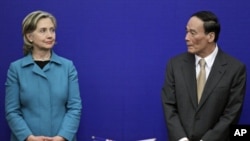Chinese Vice Premier Wang Qishan and nearly 100 Chinese trade and commerce executives will meet with their U.S. counterparts in Washington the week of Dec 13. Chinese companies are expanding their investments in the United States, making some U.S. politicians and workers unhappy, while others, such as the governor of the state of Indiana, want more.
Last month, Governor Mitch Daniels of the Midwestern state of Indiana traveled to China to encourage Chinese companies to invest in his state and to increase his state's exports into the country. Indiana derives much of its income from manufacturing, but nearly 10 percent of its population is unemployed.
Indiana welcomes infusion
At the end of the trip, Indiana received pledges from a handful of Chinese companies to open or expand factories in the state.
Mitch Roob, who heads Indiana's Economic Development Corporation, the state's investment agency, said, "We walked away from China with over 20 real leads for transactions here in Indiana. So we're very excited about that. They range all the way from health care transactions to insurance to automotive to batteries to furniture to agriculture. The opportunities in China are enormous for a state with a robust economy like Indiana has."
A recent survey by the international consulting firm KPMG of 150 Chinese executives shows that about half of those from large companies said they plan to acquire U.S. assets in the next three years. Last year, Chinese companies invested $42.6 billion in mergers and acquisitions overseas.
The failure of China National Offshore Oil Corporation, a state-owned company, to buy a U.S. company, Unocal, in 2005 because of national security concerns cast doubts on whether Chinese companies could close big deals in the U.S. Business analysts say Chinese companies, however, have improved their business acumen and have taken advantage of the U.S. recession.
In October, CNOOC invested $1 billion in a Texas shale oil and gas field. China's largest bank, ICBC, bought a small stock brokerage firm in New York.
Big deals questioned
In July, a Chinese company bought Nexteer Automotive, a General Motors subsidiary, for $450 million. Nexteer is the second-biggest employer in Saginaw, Michigan, a community that has a jobless rate of more than 11 percent.
Some Nexteer employees worried that they would lose their jobs if the new owners moved operations to China. Others were not happy that a company that was once part of America's automotive giant is now under Chinese control. But the company has added at least 100 engineering jobs since the deal was announced.
Also this year, Anshan Iron and Steel, China's fourth largest steelmaker, wanted to open a $168 million joint venture with a U.S. company, Steel Development Corporation, in Mississippi, the first Chinese investment in the sector. But some lawmakers and other U.S. steel companies opposed the deal, arguing that Chinese steelmakers get state subsidies. The U.S. Congress has to review any deal that could affect national security.
Advocates for Chinese deals
Derek Scissors, a senior fellow at the Heritage Foundation, a policy research institute in Washington, calls some of the reasoning against Chinese deals in manufacturing and natural resources "absurd."
"When I talk to members and [congressional] representatives about this and ask where the opposition comes from, they tell a story about what might happen - this could happen, and this could happen and then this could happen and it's a big problem," said Scissors. "Well, why don't we wait until that happens and take action to prevent the problem that you imagine would happen sometime in the future?"
The U.S. jobless rate remains close to 10 percent two years after the start of the worst recession since the 1930s.
Scissors says Chinese investments benefit both countries. "It keeps American jobs here. It's useful for China to be allowed American natural resources. The U.S. is extremely rich in almost all natural resources, oil being the only real exception. China is in desperate need. The U.S. has a very good investment environment for Chinese companies and it's understandable that China wants to invest here. And China overpays, to be frank, for natural resources, so why not let them overpay for American natural resources?"
Gaining equal access
But some U.S. business executives and politicians complain that Beijing limits the access of U.S. companies wanting to expand into China. U.S. Commerce Secretary Gary Locke says the issue will be addressed during a meeting between U.S. and Chinese commerce and trade officials in Washington next week.
"We would like to see more reciprocity from our partners in China and a stronger commitment to pursuing the market-opening policies that China agreed to when it originally joined the WTO (World Trade Organization)," he said.
In Indiana, Roob says investments have cut both ways. For example, Indiana corn growers supply popcorn to a large Chinese theater operator and Indiana companies are partnering with Chinese companies on renewable energy. That means jobs for Indiana residents, who call themselves "Hoosiers."
"About 12 percent of Hoosiers today currently work for companies owned by foreign companies. So there's really not a lot of chauvinism or xenophobia for Chinese investments or for that matter Japanese investments or German investments."
With many U.S. states experiencing high unemployment and debt, governors of other states, such as California and Minnesota, have recently made trade-promotion trips to China, too. Indiana officials plan another visit to China early next year.










